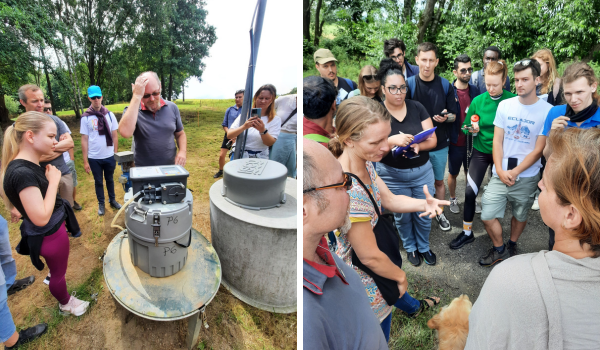The Summer School was held from 2nd to 8th July 2023 in Prague, Czech Republic, and aimed to enhance practical knowledge, skills, and competencies to support improved implementation of natural, small and underutilized water and nutrient retention measures. The program comprised 18 lectures and 8 dedicated group work sessions. In addition to 22 hours of lectures and 12 hours of group work, participants experienced a real-life stakeholder assembly and a full day field visit to the OPTAIN case study area, Čechtický stream.
On the arrival day, the participants were introduced to the project OPTAIN and its innovative methods by the project lead partner Martin Volk and Felix Witing (Helmholtz Centre for Environmental Research - UFZ, Germany).

The second day was dedicated to the participants’ introduction and experience-based learning to setting the working environment, and to the topics of Policy Framework, Stakeholder Engagement and Natural Small Water Retention Measures (NSWRM). These topics were led by Ingrid Nesheim (NIVA - Norwegian Institute for Water Research, Norway), Rozalija Cvejic (University of Ljubljana, Slovenia), and Tatenda Lemann (University of Bern - Centre for Development and Environment (CDE), Switzerland). The participants were divided into smaller groups, each tasked with a unique problem to solve. The participants were guided in a process of gaining new skills. All required knowledge and tools were applied during group work sessions. They developed various scenarios and solutions, with the lectures complementing one another.
During the field visit, led by Antonin Zajicek and Veronika Sitkova (Research Institute for Soil and Water Conservation - VUMOP, Czech Republic) and Tatenda Lemann, the students visited predetermined project sites with applied NSWRM. Various practical aspects of NSWRM application were discussed with the lecturers and stakeholders directly in the field. The students had a unique opportunity to get insights from farmers about their challenges, everyday work and the benefits of NWSRM. The students learned about the catchment monitoring (stream runoff, weather, drainage, groundwater, water quality sampling), NSWRM and soil conservation measures that are practically applied.
During the following few days, the students continued working with all the acquired knowledge and data, scripts and models for measures allocation needed for preparation of the group ́s unique solution. This work was guided by Mikolaj Piniewski (Warsaw University of Life Sciences - SGGW, Poland), Brigitta Szabo and Piroska Kassai (Centre for Agricultural Research - ATK, Hungary) and Michael Strauch (Helmholtz Centre for Environmental Research - UFZ, Germany). Global Water Partnership’s Senior Learning Specialist, Gergana Majercakova, engaged students in a session on innovative knowledge management approaches, specifically in Integrated Water Resource Management (IWRM). She presented the IWRM Action Hub, and the participants had the opportunity to dive deep into the concepts and practical examples of different Communities of Practice, discussing the value of peer-to-peer learning and knowledge exchange.

Under the guidance of Csilla Farkas (NIBIO - Norsk Institutt for Biookonomi, Norway) and Maria Eliza Turek (Agroscope, Switzerland), participants delved into climate and land use scenarios modeling, applying different measures at a plot scale. They learned about the process of SWAP model set-up and calibration, and data needs. Furthermore, the students learned about the modeling at watershed scale and, under the guidance of Michael Strauch, they explored the unique OPTAIN approach for NSWRM allocation optimization. With Natacha Amorsi and Philippe Lanceleur (OiEAU - International Office for Water, France) the students exchanged their knowledge about OPTAIN’s interactive Learning Environment.
Stakeholder assembly
After the successful finalization of the curriculum the students worked on their final presentations, summarizing the tasks they had completed on their individual case studies during the week. Their presentation was the answer to local water governance challenges. The solutions were built on the information they had acquired and the resources they had created or given access to. The students shared their solutions with the stakeholders from different countries during a Stakeholder Assembly. The full list of invited stakeholders included: Jean Rousselot (WWF France / water management and biodiversity, wetland and river restoration, hydrology, pedology, flood and drought prevention, projects management, and environmental law), Attila Lovas (Middle Tisza Office Directorate, GWP Hungary), Martin Volk and Michael Strauch, Tatenda Lemann, Brigitta Szabo, Natacha Amorsi and Philippe Lanceleur, Maria Eliza Turek, and last but not least, Vit Ruzicka from the Ministry of Agriculture of the Czech Republic. The stakeholders asked questions and gave feedback to the presented solutions. The students discovered their potential and focused their efforts on their future plans as aspiring water professionals thanks to this final test of their professional skills. The Summer School ended on a high note with a plan to a follow-up cooperation and commitment to support each other in their professional growth.
About GWP CEE Summer School
GWP CEE Summer School is a flagship youth initiative of the Global Water Partnership Central and Eastern Europe. Each year, the Summer School brings together a cohort of aspiring young water and climate specialists to enhance their education and practical experience. The Summer School is based on a combination of theory and practice presented by a plethora of speakers from relevant backgrounds. Making use of the problem-based, competence-oriented, experiential, and transformative learning, group work, intercultural team interaction, and interaction with stakeholders, the students experience a unique journey of learning and practice. They finish with new experiences to tackle sustainability challenges of our lifetime by using cutting-edge knowledge in developing their careers.
This year summer school was organized together with the OPTAIN project partners and supported also from EU Strategy for the Danube Region, Priority Area 4 (Water Quality).
